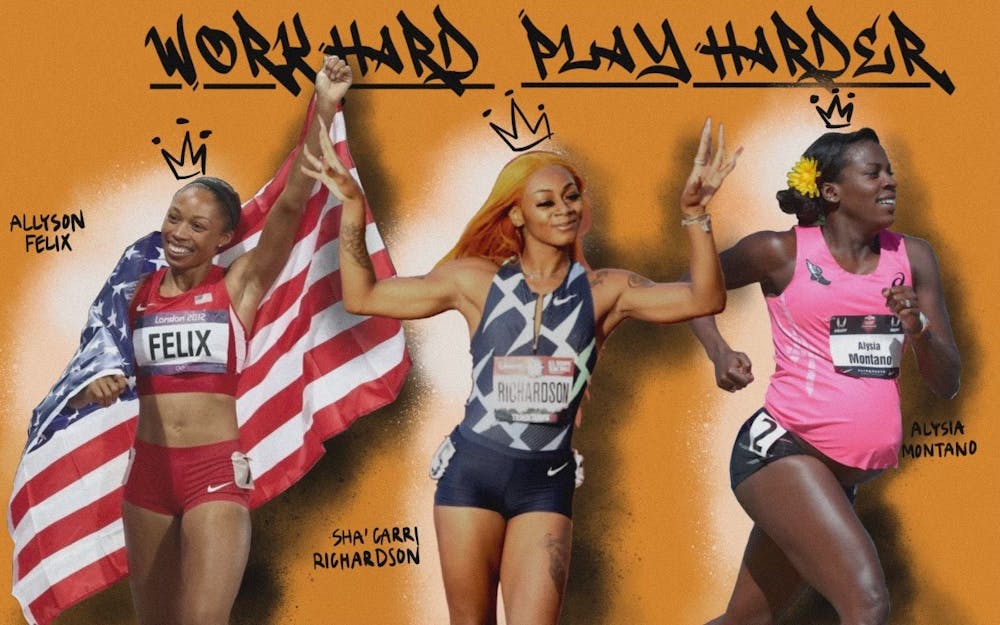Sports love Black women and Black people overall, but only when they are profitable and doing what they're told. A place to celebrate their respective talents while also pushing against racism, sexism and politics. Lately this has been seen with Colin Kapernick vs the NFL and events like these where Black athletes can be and are punished for actions that segments of the sports community dislike.
Black women in sports have always been in a place of contrast. They are hit from both sides with racism and sexism as barriers to overcome.
A recent incident was Sha’carri Richardson being disqualified from the 100-meter in Tokyo Olympics for testing positive for marijuana. It sparked national outrage and controversy, despite marijuana not being a true performance enhancing drug.
Richardson explained her use of marijuana was a way to cope with losing her mother, whose death she learned of from a reporter during an interview. She recalled this unfortunate event as triggering and nerve-shocking.
Lots of people weren’t so understanding.
There were several people who made statements saying that she knew better and knew the rules. There was a lack of compassion— as if we are not all human.
This isn’t the first time Richardson has dealt with controversy. When she was first put into the spotlight, people had various opinions about her appearance, oftentimes comparing her figure to a man and describing her hair color as ghetto.
Clair Lehmann, a white magazine editor from Australia, suggested that Sha’Carri Richardson and Florence Griffith Joyner’s hair and nails are the result of steroid use.
“Not sure whether the nails are real or fake, but in case you didn’t know, very strong nails & hair can be a side effect of steroid use," Lehmann tweeted. "Flo Jo, obvious drug user, had the nails. She died in her sleep at age 38 because that’s what a lifetime of drug use does to the body (and why it’s supposed to be banned from elite sports)."
Here’s why it’s important to think before you speak. Everyone knows Sha’Carri wears wigs and those nails are acrylics. Richardson has acknowledged both of these in interviews and on social media before.
According to The New York Times, Joyner died from a seizure caused by cavernous angioma, an abnormality of blood vessels with no evidence of alcohol, recreational drugs or performance enhancing drugs found in her system.
Mistreatment isn't new for Black athletes. We’ve seen it countless times. Like when World Champion runner, Alysia Montaño, and the most decorated American track athlete ever, Allyson Felix, revealed Nike punished them financially for being pregnant.
For Montaño, both Asics and Nike penalized her for being pregnant, and at six months postpartum she won the 600-meter at the U.S. indoor national championships. Felix faced reduced pay and no pregnancy protections. These incidents became even more controversial in 2021 when Nike released an ad celebrating pregnant athletes without acknowledging the struggle to get there.
Along with mistreatment, stereotypes can be harmful to Black women and are commonly seen in all types of media.
The Australian Press council deemed the racist cartoon portrayal of Serena Williams not racist despite depicting her monkey-like with huge lips, according to NPR. The cartoon was posted in Australia’s ‘The Herald Sun’ and the council claimed the cartoon uses exaggeration and absurdity to make its point, and it does not depict Williams as an ape, rather, itather shows her as 'spitting the dummy', a non-racist caricature familiar to most Australian readers.
According to NPR, a "dummy" is an Australian term for a pacifier, which was drawn lying alongside Williams' racket on the ground.
It is time for change. The sports community cannot keep profiting off of Black women and expecting them to be complacent, perfect by their definition and skinny. Black women athletes are allowed to be human in the scope of having emotions and making mistakes, wearing different things like acrylics and colored wigs and being mothers. Thinking otherwise would be a detrimental mistake.






